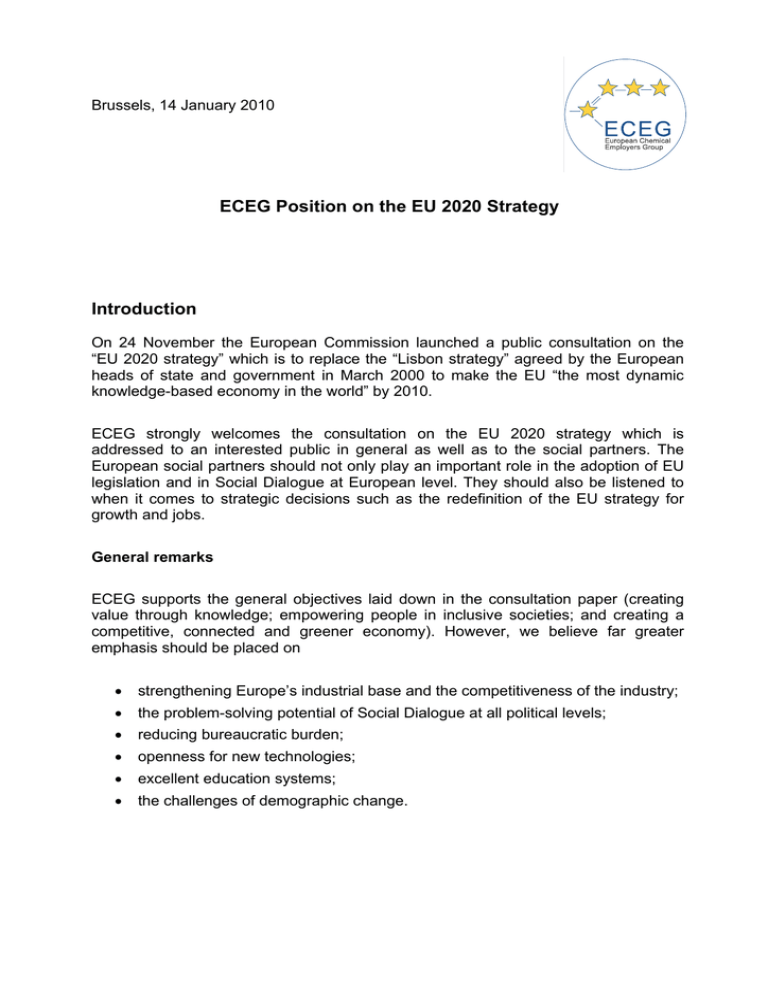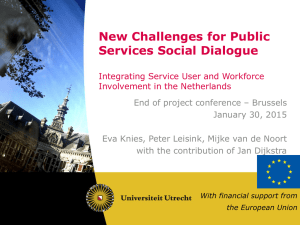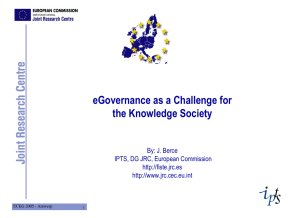ECEG Position on the EU 2020 Strategy Introduction
advertisement

Brussels, 14 January 2010 ECEG Position on the EU 2020 Strategy Introduction On 24 November the European Commission launched a public consultation on the “EU 2020 strategy” which is to replace the “Lisbon strategy” agreed by the European heads of state and government in March 2000 to make the EU “the most dynamic knowledge-based economy in the world” by 2010. ECEG strongly welcomes the consultation on the EU 2020 strategy which is addressed to an interested public in general as well as to the social partners. The European social partners should not only play an important role in the adoption of EU legislation and in Social Dialogue at European level. They should also be listened to when it comes to strategic decisions such as the redefinition of the EU strategy for growth and jobs. General remarks ECEG supports the general objectives laid down in the consultation paper (creating value through knowledge; empowering people in inclusive societies; and creating a competitive, connected and greener economy). However, we believe far greater emphasis should be placed on • strengthening Europe’s industrial base and the competitiveness of the industry; • the problem-solving potential of Social Dialogue at all political levels; • reducing bureaucratic burden; • openness for new technologies; • excellent education systems; • the challenges of demographic change. Specific remarks Paying more attention to competitiveness The EU should follow an integrated policy approach to address social and environmental issues and the challenges for the competitiveness of our industries. Such an integrated approach can provide for technologies, business development and job creation. However, much more attention should be paid to strengthening the competitiveness component: without a competitive industry, it is impossible to make Europe more social and “greener”. Strengthening Social Dialogue Social Dialogue is one of the pillars of the European social model. However, social partners are not given the key role they deserve in the working document. The “smarter, greener, more competitive economy” the Commission aims at cannot be achieved by public authorities alone. Quite the contrary: the modernisation of the European economies is doomed to fail without a multi-level consciousness that differentiates between measures to be taken at a political level (EU, member states, regions), on the one hand, and those to be taken within a sector or at company level, on the other hand. It is especially in the latter field (sector and company level) where social partners can play a central, problem-solving role. The European policy instrument of Social Dialogue is not even mentioned in the consultation document. Yet the more than 40 Sectoral Social Dialogue Committees (SSDC) that have been established so far are very successful platforms where social partners agree on a variety of sector-specific issues which do not have to be regulated through legislation. Taking demographic change seriously Demographic change has to be taken seriously. It has been well-known for a long time that future generations will have to bear a huge burden due to the ageing of our societies. Europe’s working-age population will soon start to shrink, resulting in a loss of millions of potential workers – which will have far-reaching consequences for the functioning of labour markets (e.g. skills shortage) and the sustainability of social systems. Making education systems excellent Excellent education systems are the conditio sine qua non of the “knowledge-based society”. Europe has to invest in its people if it does not want to fall behind in the globalised economy. The concept of education should not – as it is used in the consultation paper – be reduced to the extremes of higher education and the social inclusion of marginal groups. Political measures in the field of education should instead cover the whole range of institutions where knowledge and skills are attained, including vocational training. ECEG welcomes that the Commission defines the “security” component of the flexicurity concept not only in the narrow sense of social security systems but also as a result of dynamic, flexible labour markets and life-long learning. However, after the “Lisbon decade”, during which Europe has clearly not become “the most dynamic knowledgebased economy in the world”, the EU finally has to put this view into political practice. Conclusion The Lisbon agenda adopted by EU leaders ten years ago has failed. A new agenda is urgently needed to put Europe back on track after the global economic crisis. The working document put forward by the European Commission is only a first step towards a redefinition of the overall strategy for our continent. ECEG strongly believes that “Lisbon II” will fail again if the new strategy is not put on a broader basis that strengthens Europe’s industrial base and the competitiveness of its industry; acknowledges the problem-solving potential of Social Dialogue; reduces the bureaucratic burden for Europe’s companies; is open for new technologies; stresses the need for excellent educations systems; and takes the demographic challenge seriously.


